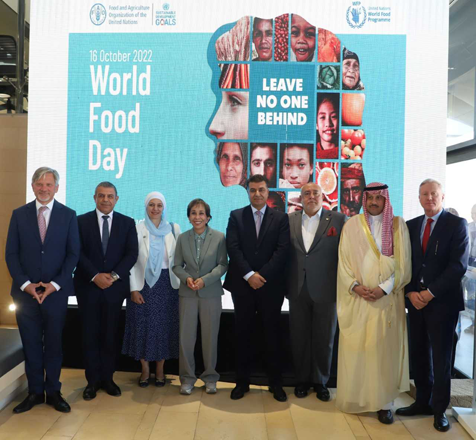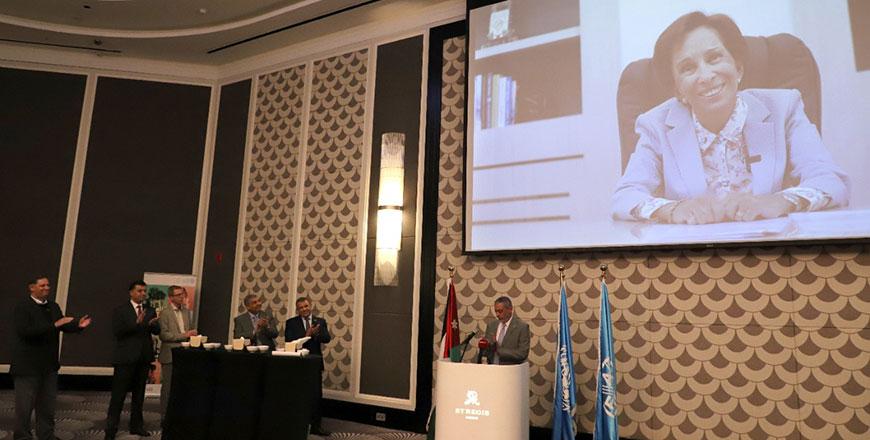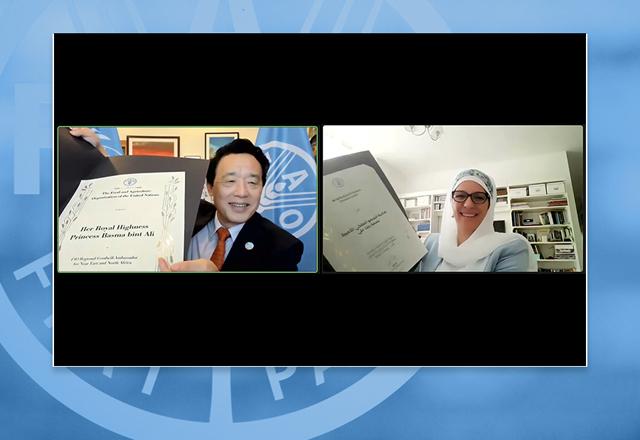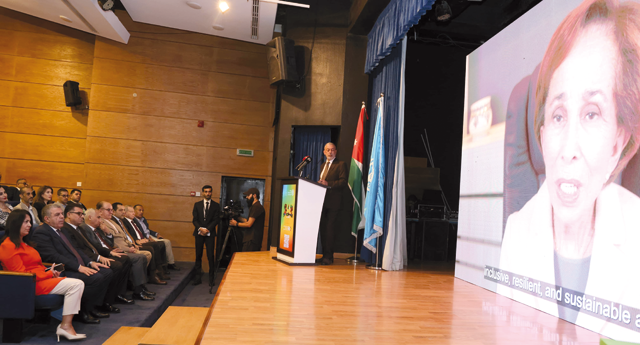You are here
Princess Basma highlights food security efforts during World Food Day
By JT - Oct 16,2022 - Last updated at Oct 16,2022

HRH Princess Basma Bint Talal and guests pose for a photo at the Royal Botanic Garden on the occasion of World Food Day on Sunday (Petra photo)
AMMAN — The Food and Agriculture Organisation of the United Nations (FAO) and World Food Programme (WFP), the leading UN agencies working towards Sustainable Development Goal (SDG) 2 of Zero Hunger by 2030, joined efforts to commemorate World Food Day in Jordan on Sunday.
Under the patronage of HRH Princess Basma Bint Talal, a ceremony was held at the Royal Botanic Garden, hosting guests from several ministries and national institutions, as well as donor and international community members, the Jordan News Agency, Petra, reported.
Princess Basma said that the world’s ongoing crises have exacerbated the problems that individual nations previously faced, posing a threat to the present and future of food security for millions of people worldwide.
Her Highness also stated that the equivalent of 40 per cent of the world’s population cannot afford a healthy diet, and that approximately 193 million people suffered from food insecurity last year and required assistance. In addition, more than half a million people died from starvation, a 400 per cent increase over the previous year, she said.
Her Highness said that the Arab region’s conflicts and crises drove many people into poverty and hunger.
This increased problems associated with the spread of desertification, particularly in the Arab region and in Africa, as well as globally through natural disasters like fires, floods and droughts that threatened vegetation cover and hastened the collapse of vital ecosystems, Petra reported.
She applauded the WFP and FAO for their efforts in addressing environmental risks and disasters, for helping displaced people and refugees, and for collaborating with Jordan’s Supreme Council for Food Security to address the most pressing issues that are increasingly affecting people.
Princess Basma emphasised the significance of urging governments and partners to prioritise the SDGs, particularly the goal related to eliminating hunger and assisting in the provision of suitable healthy foods, while also pointing out the private sector’s contribution to efforts to ensure that people have access to healthy food.
In turn, Minister of Agriculture Khaled Hneifat stated that this year’s World Food Day comes at a time when Jordan and the world are confronted with unprecedented global challenges affecting global food security as a result of climatic and political factors, the spread of malnutrition patterns, and water scarcity.
He said that Jordan, one of the most water-scarce nations in the world, is making progress towards building a comprehensive national system based on sustainable food production, bolstering local production, forming partnerships with other countries to diversify food sources and enacting laws and policies to ensure food security in all situations.
The minister stated that Jordan wants to concentrate on using cutting-edge food production technology to support the diversification and stability of the food supply chain, as well as to prevent resource waste and ensure food safety.
Dominik Bartsch, UN Resident Coordinator in Jordan, said: “Food security and healthy nutrition has also been at the forefront of the UN’s support to Jordan. The United Nations in Jordan is committed to work with the government and the people in Jordan towards equitable, affordable, safe and sustainable and reliable access to water, food and energy. This is one of our priorities for the UN’s cooperation in Jordan over the next five years.”
Nabil Assaf, the FAO representative, stated that “Rising food prices affect all of us, but the impacts are felt the most by the vulnerable and by countries already experiencing a food crisis. Today 3.1 billion people around the world still cannot afford a healthy diet. Hunger continues to rise and it affected 828 million people in 2021.”
“Now, more than ever, we need to harness the power of solidarity and collective action. Our agrifood systems hold great potential for a more equitable and prosperous future, as they are interlinked to many areas of our lives and economy — from agriculture to natural resources, to energy, to health, and many more. Agriculture is among the most cost-effective humanitarian interventions,” he added.
WFP Representative and Country Director for Jordam Alberto Correia Mendes said that the global food crisis will push more families into food insecurity, emphasising the programme’s commitment to addressing Jordan’s food security challenges.
He noted that the programme will soon launch its five-year strategic plan and will continue to support Jordan’s national food security strategy in collaboration with the FAO.
Under the theme “Leave no one behind. Better production, better nutrition, better environment and better lives,” World Food Day calls for the transformation of agri-food systems to ensure that everyone everywhere has access to enough, affordable, safe and nutritious food to lead active and healthy lives.
Related Articles
AMMAN — The Food and Agriculture Organisation of the United Nations (FAO) on Thursday joined the national and the international community in
AMMAN — HRH Princess Basma Bint Ali was on Wednesday named a Food and Agriculture Organisation of the United Nations (FAO) Goodwill Ambassad
AMMAN — Under the patronage of HRH Princess Basma, the Food and Agriculture Organisation of the United Nations (FAO) on Wednesday held an ev














